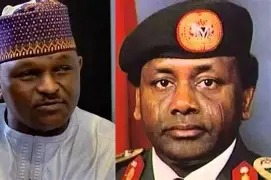Hamza Al-Mustapha, the former chief security officer to the late military head of state, General Sani Abacha, has dismissed long-standing allegations that his former boss looted Nigeria’s treasury and stashed the nation’s wealth in foreign accounts.
In an interview with the BBC, Al-Mustapha defended the Abacha administration, asserting that the funds widely referred to as “Abacha loot” were not stolen but instead allocated to support economic plans designed to stabilize the country during a period of severe financial hardship.
“At that time, the government was running under a lot of hardship. There was no money,” Al-Mustapha said. “So, we went to Libya with several people to learn how they were surviving. Libya had faced sanctions for 11 years.”
READ ALSO: Abacha’s Son Defends Late Father Following IBB’s Revelations
He claimed that after studying Libya’s economic resilience under sanctions, the Abacha regime adopted similar strategies. One such strategy, according to Al-Mustapha, involved backing Nigerian-owned companies to purchase goods and distribute them at subsidized rates to the public.
“These were the things we copied, and by God’s grace, Nigerians were not crushed,” he said. “But after Abacha died, some people didn’t return the money. Instead, they created many false stories against him.”
Al-Mustapha insisted that the funds said to have been recovered in foreign jurisdictions were not personally linked to Abacha, arguing they were deposited in national accounts.
“I don’t believe the money they say was returned to Nigeria was in Abacha’s name. The money was kept in national accounts to support this economic plan. Some returned it; others hid it,” he claimed.
READ ALSO: I survived Abacha Regime By Miracle – Wole Soyinka
He also challenged the basis of the corruption accusations. “Did Abacha ever travel abroad? Were the funds found with his signature? Or did anyone catch him transferring money? “No,” he said, suggesting the narrative of stolen wealth lacks concrete evidence.
On the state of democracy in Nigeria, Al-Mustapha acknowledged some level of political development since the return to civilian rule but criticized the outcomes for ordinary citizens. “Democracy is good, but using it in a way that harms the people is a big problem,” he said.
General Sani Abacha, who ruled Nigeria from 1993 until his death in 1998, has been at the center of numerous corruption probes, with billions of dollars linked to his regime recovered from various foreign banks over the past two decades.

